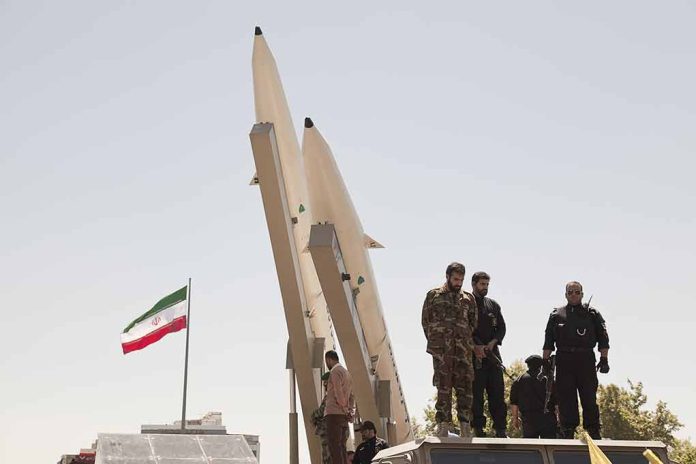
Iran-backed Iraqi militias threaten to attack U.S. troops and bases as they align with Tehran’s hostilities against America, marking a dangerous escalation in a region already consumed by Israel-Iran conflict.
Key Takeaways
- Iranian-backed militias in Iraq have launched multiple drone attacks on U.S. forces, including recent strikes at Al-Asad Air Base.
- The militias, particularly Kata’ib Hezbollah, have threatened direct attacks on American bases if the U.S. supports Israel against Iran.
- Despite being formally integrated into Iraq’s security forces, these militant groups continue operating as Iranian proxies.
- President Trump and Secretary of State Rubio have issued stern warnings to Tehran against targeting American personnel.
- The U.S. has evacuated non-essential embassy staff from Baghdad and reinforced military assets in the region in anticipation of escalating attacks.
Recent Attacks Signal Growing Threat
American forces stationed in Iraq are facing a renewed wave of aggression from Iranian proxies, with three drones recently launched at Al-Asad Air Base. This attack represents just the latest in a series of strikes orchestrated by Tehran’s network of militant groups under the banner of the Islamic Resistance in Iraq (IRI). The timing is not coincidental – these assaults come as tensions between Iran and Israel have reached a boiling point, with the United States firmly standing behind its Israeli allies in the conflict.
“U.S. forces are under attack in the Middle East,” U.S. officials have confirmed as the situation deteriorates rapidly across the region.
.@sfrantzman: “Iran-backed groups in Iraq have increased their threats to Israel in recent weeks. Iran is encouraging militias in Iraq to use drones to strike Israel. Iran has backed militias in Iraq for many years, trafficking weapons and drone technology to these dangerous… https://t.co/p5qBFhf3mF
— FDD (@FDD) April 1, 2024
Kata’ib Hezbollah’s Escalating Threats
Among the most dangerous of Iran’s proxy forces in Iraq is Kata’ib Hezbollah, a designated terrorist organization that has been incorporated into Iraq’s Popular Mobilization Forces (PMF). Despite this official integration into Iraq’s security apparatus, the group maintains its militant character and unwavering loyalty to Iran. In recent days, Kata’ib Hezbollah has issued explicit threats against American interests in the region, framing their potential attacks as retaliation for U.S. support of Israel.
“Duty requires the Iraqi government, the brothers in the Coordination Framework, and the sincere leaders to bear responsibility and take a courageous stance to prevent the expansion of the war zone, by closing the embassy of the great Satan US and expelling the American occupation forces from the country,” KH stated in a provocative message that reveals their true intentions.
Going further, the group explicitly threatened military action: “If America intervenes in the war, we will act without any hesitation against its interests and bases in the region.” These statements represent a dramatic shift from previous signals that some PMF-affiliated militias were considering disarmament, indicating Iran’s determination to maintain pressure on American forces through its network of proxies.
U.S. Response and Preparations
The Trump administration has not taken these threats lightly. In anticipation of potential attacks, the State Department has begun evacuating non-essential staff from the U.S. Embassy in Baghdad, and military dependents have been removed from the region. Additionally, U.S. European Command has deployed additional destroyers to the eastern Mediterranean to support Israel’s defense and potentially protect American assets from Iranian attacks.
“Both President Donald Trump and Secretary of State Marco Rubio have warned Tehran not to attack U.S. forces in the region,” Cameron McMillan noted in a recent analysis of the situation.
The administration’s approach reflects lessons learned from previous incidents. In January 2024, three American soldiers were killed in Jordan due to attacks by Iranian-backed militias. Security analysts have emphasized that insufficient responses to proxy attacks in the past have only emboldened Iran and its proxies to launch further assaults. Now, with air defense systems augmented throughout the Middle East and additional military assets on standby, the U.S. appears prepared to respond more forcefully to any attacks on American personnel.
Regional Implications
The Iraqi government finds itself in an increasingly precarious position, caught between its relationship with the United States and the powerful Iranian-backed militias operating within its borders. Iraqi authorities have reportedly communicated with Iran in an attempt to dissuade Tehran from using Iraq as a staging ground for attacks against American forces. However, the militias’ recent statements suggest they may act independently of Baghdad’s wishes.
“We declare that all the sites and camps of the entity [Israel] and anyone who supports it in the region are targets for us,” stated Mohammed Al Tamimi, underscoring the broader threat these groups pose not just to U.S. forces but to America’s regional allies as well.
The situation presents a stark reminder of the complex web of proxy forces Iran has cultivated throughout the Middle East. As tensions between Iran and Israel continue to escalate, with both nations launching direct attacks against each other, the threat to American forces remains significant. President Trump’s administration now faces the challenge of deterring further aggression while avoiding a broader regional conflict that would draw the United States deeper into Middle Eastern hostilities.



